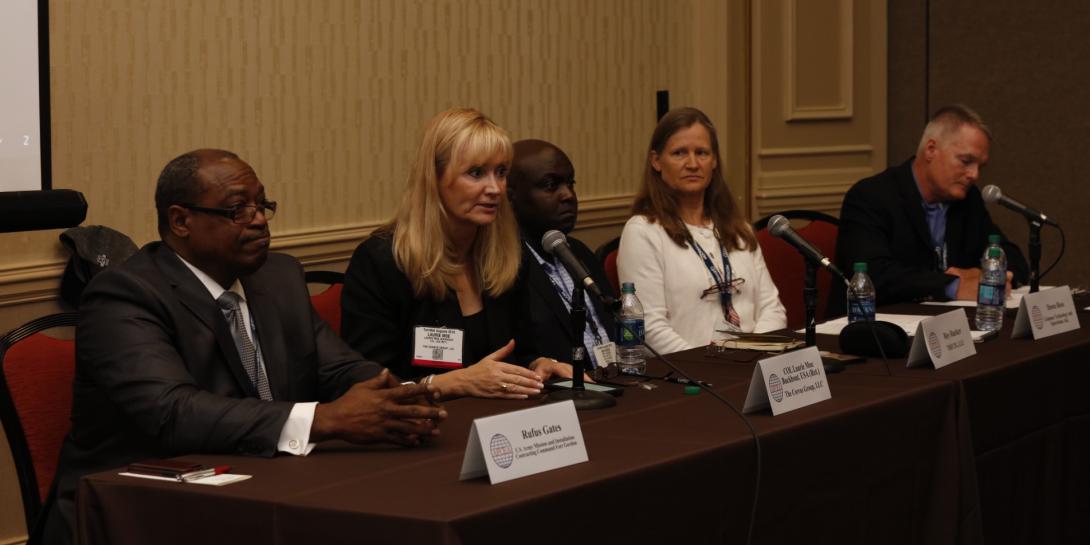Partnerships Are Force Multipliers For Small Business
Developing partnerships with diverse companies, especially to gain niche capabilities, is one of the ways small business can be competitive, even on prime contracts. But when small businesses do partner with multiple subcontractors, experts recommend certain steps, not only to protect the business but also to be seen in a positive light by acquisition officials.
Sharing their recommendations, a panel of small businesses and contracting officials came together at AFCEA TechNet Augusta to provide their advice on building and maintaining successful partnerships.
The first step before marketing yourself on a contact is to know your capabilities as they relate to the requirement, said Rufus Gates, small business specialist, U.S Army Mission and Installation Contracting Command, Fort Gordon. And before building your team, he added, know the areas where you need partners to complement you. “Pay attention to advance acquisition plans and then be sensitive to how they will fit your wheelhouse,” said Gates.
Before the contract award, prepare for the capabilities briefing with your team, and have a game plan “like a coach does before a football game,” Gates emphasized. Make sure your subject matter experts for each area participate. “We want to know that all your team knows what they are talking about. Your proposal should mirror what you do during the briefing,” he added. The government wants to hear from the people who are going to do the work.
It is also important to archive the information if you respond, Gates advised. If you don’t win, you want to be ready to jump on something the next time. Keep the information because, in general, requirements change very little. The people who have been engaged in the past can step ahead this way.
In a post-award debrief, if you did not win, identify any aspect of your proposal where you were not found capable, and have your partners with you at the table. In addition, if you win, make sure the team shows up. If a change in your team occurs, you better have good justification. If there is going to be a substitute, they better have the same capability, he warned.
Teaming arrangements have their good, bad and ugly aspects, and Col. Laurie Moe Buckhout, USA (Ret.), president and CEO, The Corvus Group LLC, shared her list.
Starting with the good, these arrangements provide an opportunity for you to augment what others need, either as a prime or sub. You should focus on defined opportunities that you have done your homework on and work with other reputable businesses you can trust.
Within the partnership, identify the clear-cut capabilities and know what each partner brings to the table.
Col. Buckhout recommended that small businesses develop a tight teaming agreement and a tight contract that spells out work shares and duties. She added that it is also essential to have tight nondisclosure agreements, nonpoaching agreements and noncompetes to ensure you don’t lose business or your employees or clients. ”Good fences make good neighbors, and good contracts make good business partners” she relayed.
The bad is when you do not do your homework or when you team with a business you do not know well.
It is not good to be thrown together for an opportunity but not be sure what is going on. You have to have trust too. “If you are dealing with either primes or subs you do not think you can trust, walk away. It is not worth it,” she warned.
Roy Rucker Sr., CEO and founder, TRECIG LLC, began his small business about a year ago, but as the former chief technology officer for the Pacific theater, he engaged with more than 200 vendors over the years. “I heard a lot of how big companies duped the small contractors when they got what they wanted and kicked the small to the curb,” he said. He also said, as a small business, you sometimes don’t get paid or paid in time, as was the case for him with his first engagement.
If it gets ugly, you might have to walk away or hire a lawyer, added Col. Buckhout. But keep in mind that, even if you hire a lawyer and win, you are still out money, even if you have a moral victory.
“If you are going to be a defense contractor, you need to go out and buy some thick skin,” Gates interjected. “Most who have been around know that. This is business. I firmly agree we can disagree without being disagreeable. Everyone is not going to pay patty cake with you real nice. Don't blow a relationship because someone says something you don't like. Mission is first, so we want you to have the same focus on your mission when you come to the table,” he emphasized.
Agreeing with her colleague, Col .Buckhout added, “Be willing to take small losses for big gains. You may not be the homecoming queen, but you will get work.”
Market to other contractors the existing contract vehicles that can be used, because for small or micro businesses in niche areas, that information may not be known, recommended Dawn Ross, chief information officer, Grimmer Technology and Operations Incorporated. “It doesn't always have to be a new vehicle.” Also, look for sub set-aside opportunities where large businesses are incentivized to subcontract to smalls, she said. If you are an 8A, look for 8A Sole Source opportunities and for partners who want to bring you work, she added. “Large businesses are incentivized to look for you, but you need to tell them why,” Ross added.
In addition, Ross explained that the Small Mentor Protege program is a game changer. The earlier the better for taking take advantage of it.




Comments